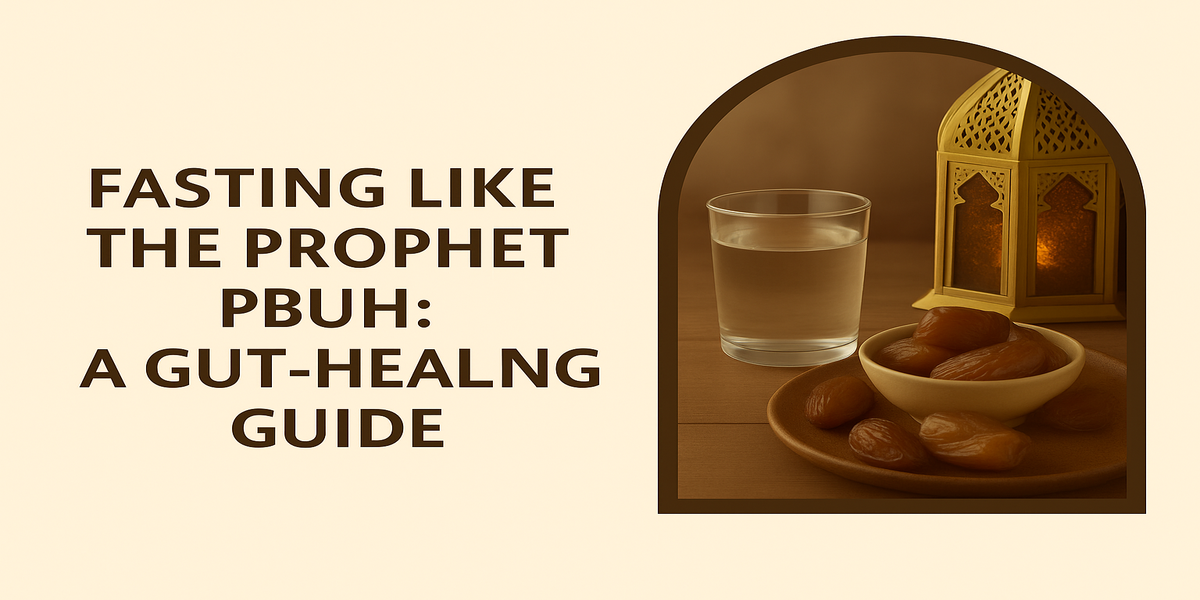
Prophetic Guidance
“Fasting is a shield.” (Muslim)
In Islam, fasting is more than abstaining from food and drink. It acts as a shield, protecting the body, mind, and soul. Alongside spiritual rewards, fasting offers powerful health benefits—especially for the gut.
Why Fasting Matters for Gut Health
Modern science now supports what the Sunnah emphasized centuries ago: fasting resets the digestive system and supports overall wellness.
- Microbiome reset: Intermittent fasting improves gut microbiome diversity and balances bacteria linked to better digestion and immunity ( Frontiers)
- Reduced inflammation: Controlled fasting lowers inflammation and strengthens gut barrier integrity (F
- Improved metabolism: Fasting supports insulin sensitivity, gut motility, and healthier blood sugar regulation.
- Ramadan studies: Research shows that Ramadan fasting positively changes gut microbiota, increasing beneficial bacteria and promoting digestive resilience (Frontiers in Microbiology, 2021).
Practical Sunnah Fasting Tips: Follow the Prophet’s Routine
The Prophet ﷺ practiced voluntary fasts outside of Ramadan, which provide both spiritual and physical benefits. In our overstimulated lives, Sunnah fasting can be a powerful practice of disconnection from the noise and reconnection with the self. It teaches us to sit with discomfort, to observe our reactions, and to emerge with clarity and calm.
- Mondays & Thursdays: Regularly fasting these days was from his Sunnah (Abu Dawood).
- The White Days (Ayyam al-Beed): Fasting on the 13th, 14th, and 15th of each lunar month (An-Nasa’i).
- Ramadan Reset: Break fast with dates and water, then eat a modest meal in line with the 1/3 Rule (one-third food, one-third drink, one-third space).
These practices not only honor Prophetic traditions but also give your gut the rest it needs.
“Deeds are presented on Mondays and Thursdays, and I love that my deeds be presented while I am fasting.” — Sunan al-Tirmidhī 747, Sahih
Real-Life Applications
- Work routine: On fast days, plan lighter tasks and break fast with simple, gut-friendly foods.
- Meal prep: Cook balanced, fiber-rich meals in advance to avoid overeating at iftar.
- Hydration: Rehydrate steadily between iftar and suhoor, avoiding sugary or carbonated drinks.
- Mindful eating: Stop at satisfaction, not fullness, to prevent bloating and sluggishness.
Reflection
Fasting is both a form of worship and a health practice. It disciplines our appetites, rests our digestive systems, and reminds us that health is a trust (amanah). By fasting like the Prophet ﷺ, we not only grow spiritually but also protect and heal our gut—a true shield for body and soul.
References:
- Frontiers in Nutrition, 2022
- Frontiers in Nutrition, Gut Microbiota Study
- ScienceDirect – Gut Remodeling and Intermittent Fasting
- Muslim – “Fasting is a shield.”
